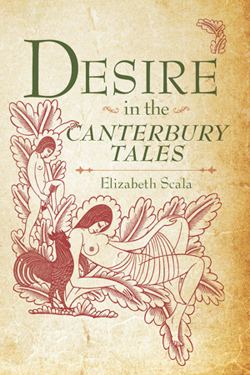Desire in the Canterbury TalesElizabeth ScalaInterventions: New Studies in Medieval Culture |

3/30/2015 Literary criticism/medieval 248 pp. 6x9  $66.95 cloth 978-0-8142-1278-3 Add cloth to shopping cart $27.95 paper 978-0-8142-5199-7 Add paper to shopping cart $27.95 PDF eBook 978-0-8142-7560-3 Add PDF eBook to shopping cart Shopping Cart Instructions Review/Change Shopping Cart & Check-out | |||
|
“This book pursues an analysis of desire that is both theoretically sophisticated and historically sensitive. It makes a major contribution to Chaucer studies, to psychoanalytically-inflected work in medieval studies generally, and to the field's ongoing discussions of literary formalism, gender and sexuality, and religion.” —Mark Miller, University of Chicago Chaucer’s Canterbury Tales is a discourse of desire. Beyond the many pilgrims’ stories taking desire as their topic, Elizabeth Scala argues that desire operates in structurally significant ways found in the signifying chains that link the tales to each other. Desire in the Canterbury Tales coordinates the compulsions of desire with the act of misreading to define the driving force of Chaucer’s story collection. With Chaucer’s competitive pilgrimage as an important point of departure, this study examines the collection’s manner of generating stories out of division, difference, and contestation. It argues that Chaucer’s tales are produced as misreadings and misrecognitions of each other. Looking to the main predicate of the General Prologue’s famous opening sentence (“longen”) as well as the thematic concerns of a number of tale-tellers, and working with a theoretical model that exposes language as the product of such longing, Scala posits desire as the very subject of the Canterbury Tales and misrecognition as its productive effect. In chapters focusing on both the well-discussed tales of fragment 1 and the marriage group as well as the more recalcitrant religious stories, Desire in the Canterbury Tales offers a comprehensive means of accounting for Chaucer’s poem.Elizabeth Scala is associate professor of English at the University of Texas at Austin. | ||||

